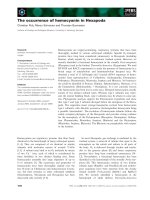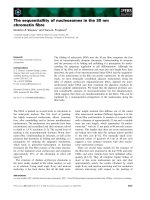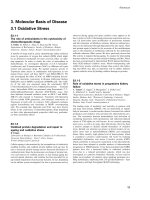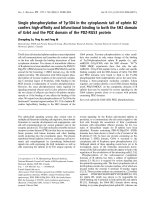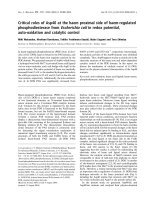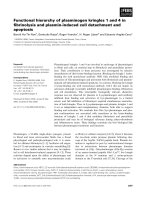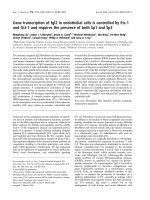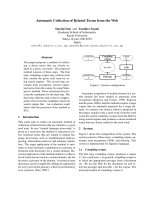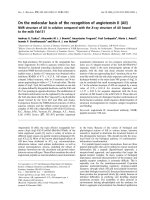Báo cáo khoa học: Regulatory roles of hyaluronan in health and disease ppt
Bạn đang xem bản rút gọn của tài liệu. Xem và tải ngay bản đầy đủ của tài liệu tại đây (51.37 KB, 1 trang )
MINIREVIEW SERIES
Regulatory roles of hyaluronan in health and disease
Vincent Hascall
1
and Nikos Karamanos
2,3
1 Cleveland Clinic Lerner College of Medicine, Biomedical Engineering ND-20, Cleveland, OH, USA
2 Department of Chemistry, Laboratory of Biochemistry, University of Patras, Greece
3 Foundation of Research and Technology (FORTH ⁄ ICE-HT), Greece
The glycosaminoglycan hyaluronan (HA) is a major com-
ponent of extracellular matrices with many diverse func-
tions that depend on its chain size and its interactions
with various effective proteins and cell receptors. Such
interactions trigger several intracellular signaling path-
ways that regulate growth, differentiation and migration.
HA is implicated in physiological and pathological pro-
cesses, including embryogenesis, morphogenesis, wound
healing, tissue repair, inflammation and the progression
of several diseases, among them cancer and diabetes.
Recent data suggest a regulatory role of HA in cancer cell
migration, invasion and metastasis, and implicate its
interaction with variants of the cell surface HA receptor
CD44 in the molecular targeting of solid tumors. HA
research areas are expanding so rapidly that it is not pos-
sible to cover all HA functions. The three thematic mini-
reviews, however, provide the reader with focused
assessments of the current HA research areas.
The first minireview by Wang et al. focuses on the dis-
covery of monocyte-adhesive HA matrices and how they
have morphed into various pathologies, including inflam-
matory bowel disease, wound healing, asthma and diabe-
tes. Notably, the unique mechanism by which HA is
normally synthesized, namely the utilization of cytosolic
substrates with extrusion of the growing HA polymer into
the extracellular matrix, has a major role in its large vari-
ety of normal and pathological functions. This is an
emerging area of research that will impact on most, if not
all, inflammatory processes.
The second minireview by Tammi et al. focuses on the
novel regulatory points in HA synthesis that have recently
been discovered. Furthermore, it highlights the role of
several factors influencing the expression of the HA syn-
thases (HASs), as well as the transcriptional events in the
HAS gene promoter, traffic of HAS from the Golgi appa-
ratus to the plasma membrane, post-translational modifi-
cations of the HAS protein and the pivotal role of the
UDP-sugars as HAS substrates and feedback controllers
of HAS expression. As the accumulation of HA in malig-
nant tumors promotes their growth and spread, the iden-
tification of control points of HA synthesis may offer
opportunities for drug development.
The third minireview by Misra et al. focuses on new
aspects concerning the interaction of HA with CD44 vari-
ants (CD44v) and how this interaction triggers several intra-
cellular signaling pathways regulating proliferation,
migration and differentiation. Reactive stroma in cancer is
often characterized by an increase in cancer-associated
fibroblasts ⁄ myofibroblasts, which produce an array of
growth factors and chemokines that amplify the synthesis of
HA. The interaction of HA with CD44v facilitates cancer
progression and invasion ⁄ metastasis with respect to stromal
HA crosstalk with epithelium CD44v. This minireview high-
lights recent findings in tumor–stromal interactions and
their possible roles in HA–CD44v-induced tumor growth
and invasion, together with fresh insights into the enigmatic
nature of CD44 splice variants, and how the suppression of
HA–CD44v interaction may be a novel therapeutic target.
We hope that this thematic minireview series will bring
these emerging concepts to the readers, will highlight the
importance of HA in the signaling and regulation of cellu-
lar events, and will stimulate new studies in this very
interesting research area that will provide a deeper under-
standing of disease progression and treatment.
Dr Hascall is a staff member of the Department of Biomedical Engineering and Orthopedic Surgery at the Cleveland Clinic,
Cleveland, Ohio, and a Professor of Biological Chemistry at Case Western Reserve University. He is currently an Associate
Editor for the Journal of Biological Chemistry. His current research interests include connective tissue biology and the role
of HA matrices in inflammations. Dr Hascall is a co-founder of the International Society for Hyaluronan Sciences (ISHAS)
and has authored over 250 papers and book chapters on the structure and function of proteoglycans and HA, and their
involvement in tissue organization and function. He has received honorary degrees at the University of Lund, Sweden, and
the University of Kuopio, Finland, and was honored by the University of Patras, Greece, in 2009.
Dr Karamanos is a Professor of Biochemistry at the University of Patras, Greece. He has been the driving force in coordi-
nating the Meetings of Matrix Biology, the FEBS Advanced Lecture Courses on Matrix Pathobiology, Signaling and
Molecular Targets in Greece. His current research interests include the importance of proteoglycans, glycosaminoglycans
and metalloproteinases in cell signaling and in the molecular targeting of cancer. Dr Karamanos has published more than
200 papers and book chapters and is the Vice-President of the Hellenic Society of Biochemistry and Molecular Biology,
the contact person for the Federation of Connective Tissue Societies, and the current Head of the Department of Chem-
istry, University of Patras.
doi: 10.1111/j.1742-4658.2011.08068.x
FEBS Journal 278 (2011) 1411 ª 2011 The Authors Journal compilation ª 2011 FEBS 1411
